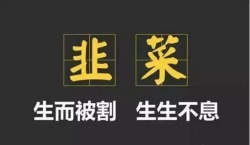Cut chives
来自China Digital Space
gē jiǔcài 割韭菜

A self-deprecating description of individual investors who re-invest in the stock market after initial losses; also used to address youth disillusionment and endemic government corruption.
In addition to the prolonged U.S.-China trade war that began in 2018, another reason the Chinese stock market has experienced its fair share of wild ups and downs since 2015 is that individual and often inexperienced investors—also known as “scattered” investors (sǎnhù 散户)—account for a high percentage of investor accounts on Chinese stock exchanges. With precious little knowledge of market dynamics, these individuals can be swayed by policies and propaganda that rouse angry protests after they subsequently suffer losses. However, just as chives will regrow after being cut above ground, after some time has passed, they may ultimately return to try their hand at it again.
It has also been used to describe an inherent tension and ecosystem of "mutual harm" between the youth and the preceding generation, in which the youth suffer socioeconomic pressure or disillusionment from soaring house prices, and from fraudulent business practices by which billions of dollars have been stolen from investors.
CDT editors' searches for the term yielded no results on Weibo on September 20, 2018, suggesting it has become a "sensitive word." The following comments come from FreeWeibo.
Renjianrenaideroutangseng (@人见人爱的肉唐僧): After the middle class becomes the backbone of society, it must demand political rights. Therefore, in order to maintain the autocratic regime, we must regularly cut the chives, in order to maintain a sense of hatred between the middle class and the poor.
中产阶级成为社会中坚后必然要求政治权利。所以,为了维护专制政权,必须定期割韭菜,并维系中产与贫困阶层之间的仇恨 [Chinese]
"Cut chives" is also used as a metaphor for the inability to curb endemic corruption, as a new generation of corrupt officials would only spring from the place of the fallen. Officials have argued against this line of thinking, stating that the government is consciously seeking to dig out corruption from the roots.
//Zhanlueweiping- (@战略微评-): //@Chujiantezhenzu: In managing corrupt officials, one cannot adopt the method of cutting chives. Rather, one should treat both the symptoms and the disease, and establish a comprehensive, long-term governance mechanism. //@Boshuchangqing1: Present the officials who are preparing to die, use your pen to confess to the people the entire process of how you are walking the road to ruin. Pull back the dark curtain on officialdom, unmask the officials that force you to walk the road of ruin. This will bring our souls peace. //@Zhanlueweiping-: @Shezhengwangyeyouhuashuo @Yannanxuan
//@除奸特侦组: 对贪官的治理不能采用割韭菜式的方法,而应该是治标治本和建立—套完备地长效治理机制。//@柏树常青1:奉告准备死的官员,用你的笔向人民坦白你走向不归路的全过程.揭露迫使你们走向死路的官场黑幕,揭露你们上级的上级潶幕.以求得灵魂的安吟.//@战略微评-: @摄政王爷有话说 @燕喃轩 [Chinese]




